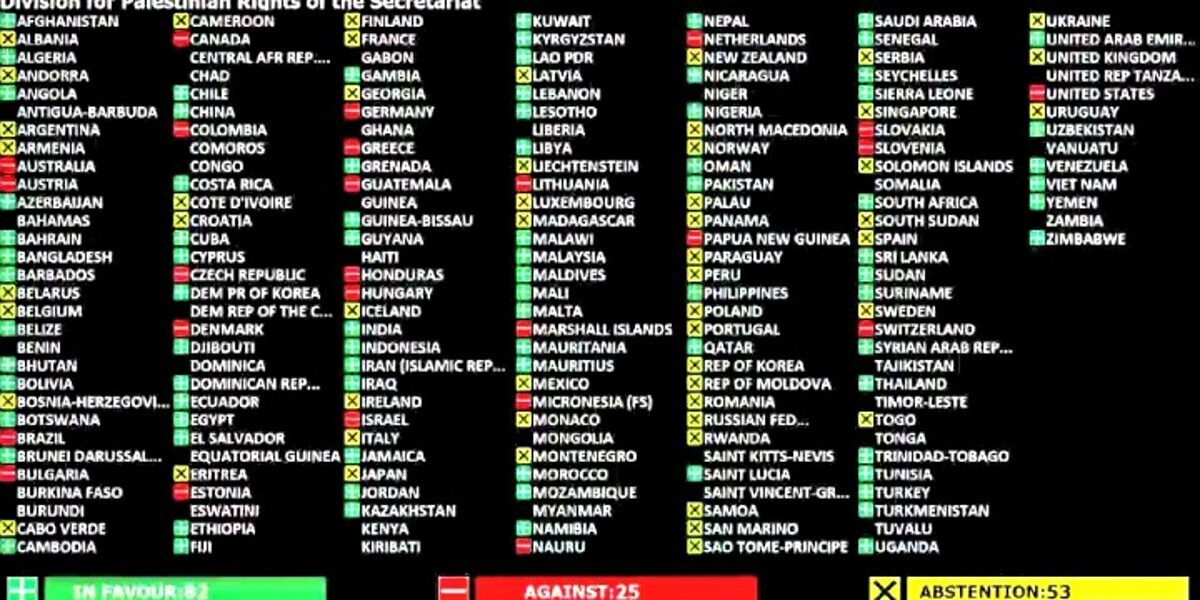Palestinian leaders on Thursday insisted that the UN General Assembly’s adoption of a series of anti-Israel resolutions was proof of “the international consensus on the inalienable rights of the Palestinian people” — despite a marked drop in support for these resolutions among member states that were stalwart supporters of the anti-Zionist cause at the UN in the recent past.
In a statement on Thursday, PLO Executive Committee member Hanan Ashrawi said that the passage of five resolutions renewing the pro-Palestinian infrastructure of committees and bodies within the UN created over 40 years ago was further affirmation of “the international consensus on the inalienable rights of the Palestinian people.”
Palestinian leaders insisted last week that the UN General Assembly’s adoption of a series of anti-Israel resolutions was proof of “the international consensus on the inalienable rights of the Palestinian people” — despite a marked drop in support for these resolutions among member states that were stalwart supporters of the anti-Zionist cause at the UN in the recent past.
In a statement on Thursday, PLO Executive Committee member Hanan Ashrawi said that the passage of five resolutions renewing the pro-Palestinian infrastructure of committees and bodies within the UN created over 40 years ago was further affirmation of “the international consensus on the inalienable rights of the Palestinian people.”
“These resolutions, which cover the peaceful resolution of the question of Palestine, the Committee on the Exercise of the Inalienable Rights of the Palestinian people, Division for Palestinian Rights of the Secretariat, and the Special Information Program on the Question of Palestine, will be followed by others in the coming days on various aspects of Palestinian rights,” Ashrawi said.
Ashrawi then urged member states to follow up their votes at the UN by cutting bilateral ties with Israel.
“The occupier must face real and actionable consequence for its abject disregard for the internationally-recognized national and human rights of the Palestinian people,” she said.
Absent from the PLO’s reaction, however, was any acknowledgement of the sharply declining support for UN General Assembly resolutions that undermine Israel’s legitimacy while sustaining the anti-Zionist agenda of the UN’s Division for Palestinian Rights — a 15-person department that supports the various pro-Palestinian committees, conferences and propaganda campaigns that are conducted under the aegis of the General Assembly.
According to the American Jewish International Relations Institute (AJIRI), a think tank based within B’nai B’rith International in Washington, DC, a total of 114 states voted in favor of the same set of anti-Israel resolutions in 2011. By 2019, that figure had dropped to 87.
In 2020, despite energetic efforts by Palestinian and some Arab diplomats to shore up support for the UN’s Palestinian infrastructure, only 82 states — a historical low — voted in favor of doing so.
“The fact that the vote on the UN’s Division for Palestinian Rights recorded the lowest-ever amount of ‘yes’ votes shows the frustration with the maximalist extremism of the official Palestinian position,” Gil Kapen — a spokesperson for AJIRI — told The Algemeiner on Thursday.
Kapen noted that less than half of African member states had voted in favor of the resolutions — a radical contrast with their stance just a decade ago. Among the states that changed its position was Somalia, which also belongs to the Arab League and the Organization of Islamic Cooperation.
“Historically, these votes have been seen as a litmus test of support for the Palestinians,” Kapen said. “We’re not against the Palestinians. But we don’t think these institutions are helping the Palestinians or the peace process at all.”
Kapen argued that “the momentum now is in favor an alternative approach. Obviously, we’d like to shut these institutions down and the trend shows that more nations are feeling that way.”
What Kapen described as a “new world out there” looks very different from the context in which the UN’s Committee on the Exercise of the Inalienable Rights of the Palestinian People first emerged — the mid-1970s, when the UN General Assembly passed a resolution equating Zionism with racism, and a bloc of states, led by the Soviet Union, tarred Israel as an apartheid state to be sanctioned like the white minority regimes in South Africa and Rhodesia/Zimbabwe.
At the same time, many states remain reluctant to abandon the Palestinians in the corridors of the UN even as they pursue closer bilateral ties with Israel. Both Bahrain and the UAE — which signed historic peace agreements with Israel this year — were co-sponsors of the resolutions passed this week by the General Assembly, while other countries that have pursued ties with Israel or promoted broader Muslim-Jewish reconciliation, among them Azerbaijan, Morocco and Sudan, all voted in favor.
Israel’s envoy to the UN, meanwhile, noted that the resolutions passed by the General Assembly were a reminder that “no other country in the world faces such discrimination in the UN.”
“It is time for more UN members to join us in changing this organization’s anti-Israel agenda,” Ambassador Gilad Erdan declared in a statement on Wednesday evening. “The countries that supported Israel today have understood that this package of resolutions does nothing to forward peace but serves only to entrench the Palestinians’ rejectionist position and deepen the conflict.”
Erdan expressed Israel’s gratitude to “the countries that changed their voting pattern in favor of Israel.”
“They have voted against the systematic anti-Israel bias at the UN,” he noted.
Erdan also extended “special thanks to the countries that stand by Israel’s side each year in opposing these despicable resolutions.”
First published in the Algemeiner.

